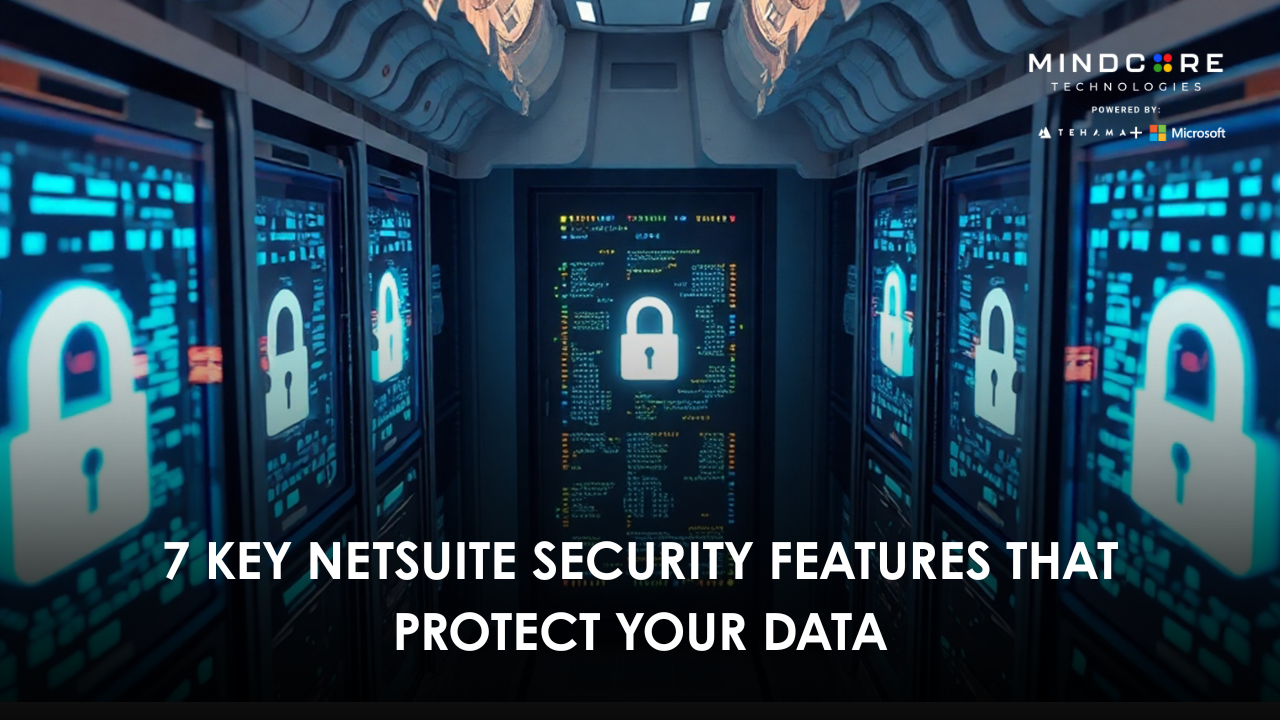Security isn’t optional anymore. Every growing business handles sensitive data—from customer records and financials to payroll and internal operations. One breach could bring operations to a halt. That’s why choosing an ERP system that protects your data is a business decision, not just an IT one.
NetSuite is built with security at its core. It doesn’t rely on third-party tools to keep your data safe. Instead, it includes built-in protections that give you control, reduce risk, and support industry compliance. In this post, we’ll walk you through seven essential security features that make NetSuite a trusted platform for thousands of businesses.
Why Built-In ERP Security Matters for Growing Businesses
The more your business grows, the more data you generate. And the more valuable that data becomes, the bigger a target you are.
Many companies use cloud-based ERP platforms to manage operations, but not all platforms have strong security built in. NetSuite takes a different approach. It bakes security into every layer—application, network, and infrastructure—so you don’t have to bolt on separate solutions.
For companies focused on business continuity and compliance, this level of security provides peace of mind and long-term stability.
1. Role-Based Access Control (RBAC)
With NetSuite, you control who sees what. Role-based access control lets you assign permissions based on job function. This keeps data visible only to people who need it.
For example, a warehouse staff member might only see inventory levels. A finance manager, on the other hand, can access payroll and billing data.
Benefits of RBAC:
- Reduces human error and insider threats
- Prevents data from being exposed to the wrong users
- Helps companies meet internal audit and compliance standards
This is one of the most important tools for keeping your ERP system clean, secure, and easy to manage.
2. Two-Factor Authentication (2FA)
Passwords alone are not enough. NetSuite supports two-factor authentication to help secure user accounts.
How it works:
- The user enters their password
- They are prompted to verify identity using a mobile app or token
This is especially useful for businesses with remote teams. Even if a password is compromised, 2FA adds a second layer that blocks unauthorized access.
It’s a simple feature that has a big impact on reducing breach risk.
3. IP Address Restrictions and Session Control
NetSuite allows you to restrict access based on IP address. This means you can lock down access so users can only log in from trusted locations, like your office network.
You can also:
- Set session timeouts to prevent idle sessions
- Monitor login attempts and detect unusual activity
These controls are often used by finance and HR teams handling sensitive data. They help limit the attack surface and give you more control over how and where the platform is accessed.
4. Full Data Encryption (In Transit and At Rest)
NetSuite protects your data at every step. It uses TLS (Transport Layer Security) for data in transit and AES-256 encryption for data at rest.
That means:
- All information sent between users and NetSuite is encrypted
- Stored data, including customer details and financial records, is locked down using industry-standard protocols
This encryption standard aligns with major security frameworks like SOC 2 and ISO 27001. If your business needs to reliable uptime and long-term system health, this feature plays a big role.
5. System Audit Trail and Activity Logs
NetSuite keeps a full log of every major action taken in the system. From user logins to data edits and permission changes, everything is recorded.
Benefits include:
- Easier internal audits
- Faster investigations when issues arise
- Full transparency into who did what and when
Teams use audit logs to quickly trace errors like incorrect inventory adjustments, unauthorized pricing changes, or failed approval attempts. IT teams also review access logs to catch policy violations or detect compromised accounts before damage spreads. When a financial report doesn’t add up, the audit trail helps you trace each number back to the source.
This audit trail supports better governance. It helps teams catch small mistakes before they become bigger problems.
6. Built-In Security Compliance Frameworks
NetSuite doesn’t just say it’s secure—it proves it. The platform meets a wide range of global and industry-specific standards.
Certifications include:
- SOC 1 and SOC 2 Type II
- ISO 27001
- GDPR readiness
These frameworks help businesses complete audits faster, meet customer due diligence requests, and maintain certifications without scrambling. For example, healthcare companies can use NetSuite’s audit logs and encryption to support HIPAA compliance, while European companies benefit from GDPR tools like consent tracking and data retention controls.
For companies operating across regions or in regulated industries, these built-in compliance tools make reporting and audit prep easier. Instead of chasing paperwork, your ERP helps you stay compliant by default.
7. Continuous Security Patching and Threat Monitoring
Security isn’t a one-time setup. NetSuite is backed by Oracle’s global cloud team, which handles 24/7 monitoring and regular patching.
Key advantages:
- Patches for known vulnerabilities are applied without user disruption
- The platform undergoes ongoing penetration testing
- Threats are detected and blocked before they reach your environment
This behind-the-scenes protection is what helps NetSuite deliver reliable uptime and long-term system health.
Final Thoughts: NetSuite Protects Your Data—Without Slowing You Down
Security doesn’t have to be complicated. With NetSuite, it’s already there—baked into the system from the ground up.
From role controls and encryption to built-in compliance and threat monitoring, NetSuite gives businesses the tools to stay safe while scaling fast. You don’t need to add third-party apps or reinvent how you work. The protection is already part of the platform.
And when combined with NetSuite’s real-time backup, uptime guarantees, and recovery planning, these security tools give you a complete strategy for business continuity. It’s not just about stopping threats—it’s about making sure your teams can keep working without worrying about what’s happening behind the scenes.For companies serious about growth, compliance, and customer trust, these security features support long-term ERP reliability and business continuity.

